When I first realized I had to seriously reassess and address my mental health, I knew that it was going to be an intensely personal journey. It would require me to be vulnerable in ways I had never been before. I knew it would be difficult — possibly the most difficult thing I had done since childbirth. Still, I understood that, in order to get the healing I needed, I had to be transparent about my path back to positive mental health. Above all else, for me this meant being honest with my kids about why their mommy was sometimes so sad, angry, and scared.
When I first started treatment, I had three young children all under the age of six. Before becoming a mother, I had promised myself that I would always be honest with my children. I wanted to treat them as equals; to see them as people with their own wills who I just happen to guide through life. So, the decision to include my kids in my therapy sessions felt like the obvious choice.
My kids weren’t at fault for my mental health issues but they were still very much impacted by them. I wanted to teach my children that their mother was an imperfect person, but that imperfection was very human. They had to know that it was not something to be afraid of. Growth, I feel, is the biggest objective in therapy. With that in mind, I hoped that, if nothing else, my children would be witnesses to my personal growth through therapy.
In all honesty, deciding that my kids would attend my therapy sessions wasn’t just for my benefit. Once I confronted the reality of my poor mental health, I was faced with the stigma that mental illness carries. At my former workplace, with my friends, and even with my loved ones, my mental health was an uncomfortable subject to others. Many didn’t know how to treat me or how to address my newly identified illness. Some would straight up change the subject when I broached the topic of mental health. During those early days of treatment, I lost more than one relationship.
I didn’t want my kids to feel the same way. For them, I wanted to normalize the concept of therapy and self-help.
This is how I explained it to my kids:
“Mommy is sick in her heart. Sometimes I feel sad for no reason, and sometimes I’m mad but don’t know why. It’s okay to feel this way but, in order to feel better, I talk about what makes me upset. This way, I can get better and become the best mommy I can be.”
It was my hope that I could take away the mystery and strangeness of these meetings and make it just another part of their life. Just like school or playdates or trips to the park, my kids also sometimes went with their mommy to the therapist. So what, not a big deal!
Hopefully, if they ever feel the need to see a therapist sometime in their lives, they will feel comfortable. Maybe one day, their own journey to mental wellness will be as familiar and soothing as any childhood memory. If they need to be vulnerable or heard, they will already know that there’s a space ready for them.
Of course, taking three kids to my therapy sessions hasn’t always been easy. There have been dirty diapers, fights over toys, tears, and tantrums. I’ve had all 3 trying to get my attention at the same time as I try to talk to my therapist. In fact, there have been a couple therapists I’ve tried out who simply didn’t like my kids being there.
Don’t get me wrong; I totally understand the reasons why. In therapy, I talk about lifelong trauma as much as I do daily frustrations. Obviously, this sometimes leads to difficult conversations I’m forced to have with my kids, but that goes hand in hand with transparency. Overall, for me, the pros outweigh the cons.
My habit of including my children in my therapy sessions isn’t for everyone. You have to be willing to be vulnerable. You have to be willing to admit that you aren’t perfect. I know these little people often already see us as perfect, but shattering that illusion isn’t as scary as you think. If you are willing to be honest and are open to its benefits, exposing your children to therapy can bring you closer to the person you aspire to be. And your kids will love you all the more for it.
In addition to therapy, these affordable mental health apps can be super helpful if you’re struggling.
Source: Read Full Article






